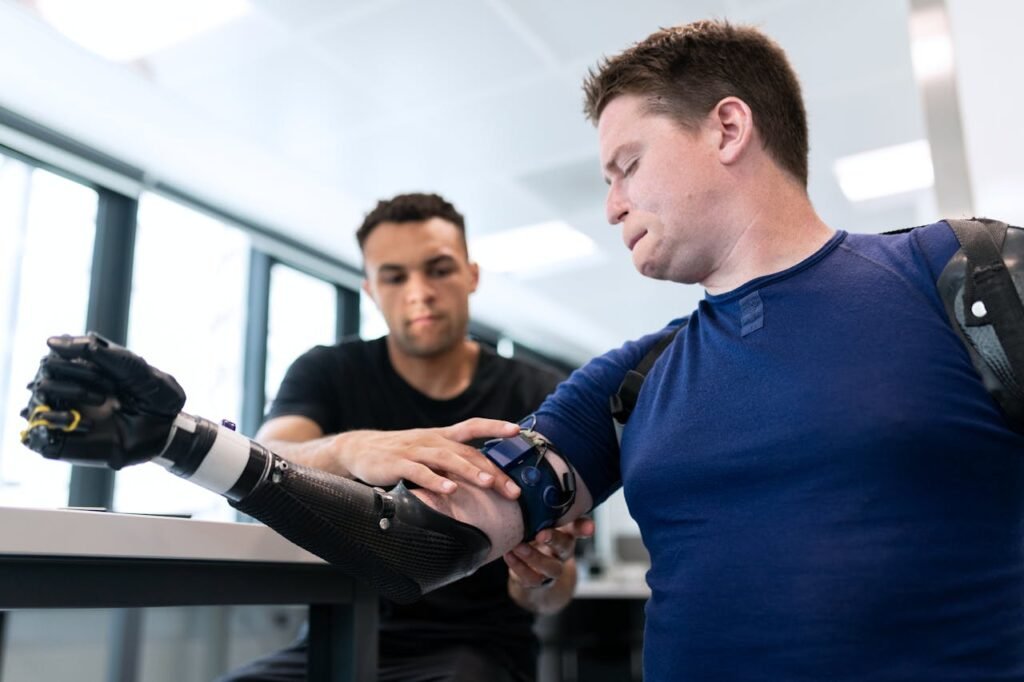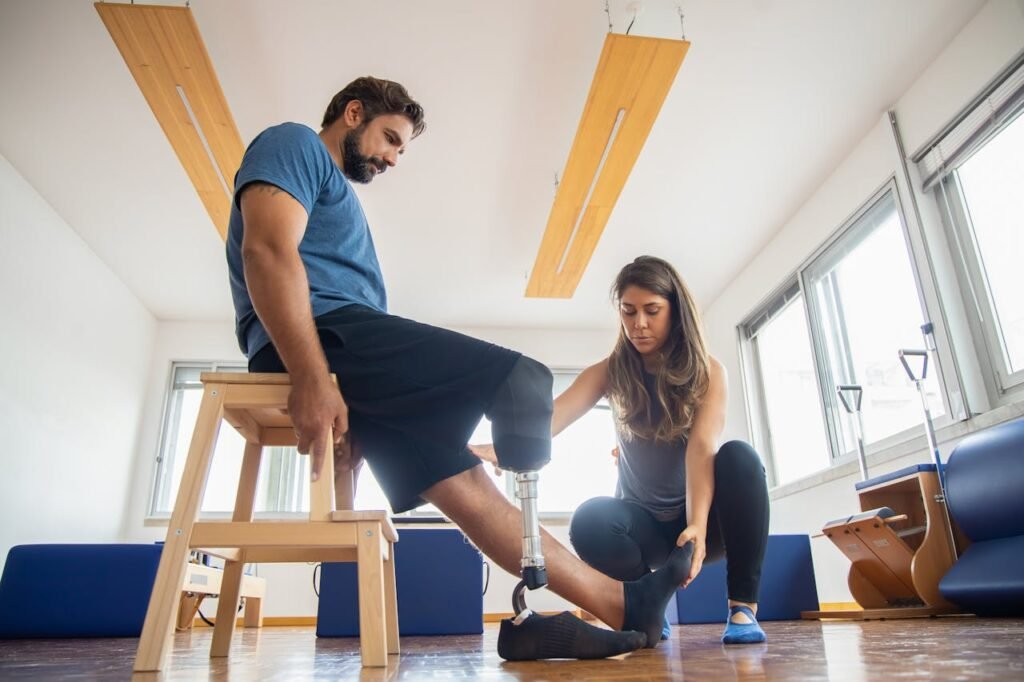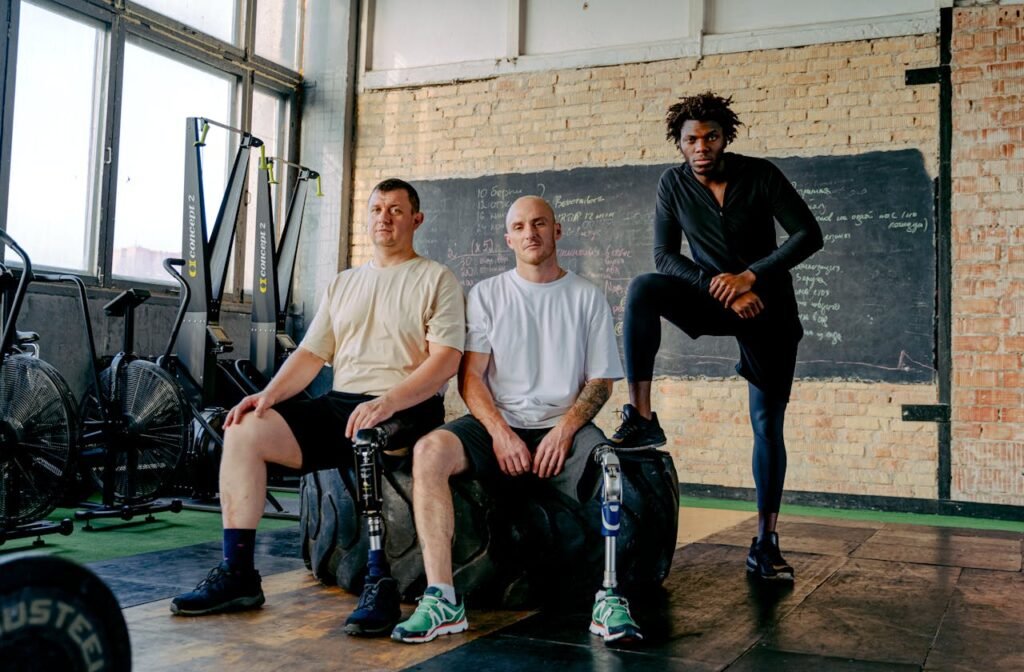Navigating the financial challenges associated with living with a disability can feel overwhelming, but numerous resources are designed to help individuals and families find support. Whether you’re looking for help with medical expenses, assistive devices, or everyday living costs, financial assistance programs can provide the stability and relief you need. However, understanding and accessing these resources often requires patience, persistence, and a clear strategy.
In this article, we’ll explore actionable steps and strategies for accessing financial assistance, highlighting opportunities to make the process more straightforward and effective. Whether you’re an individual seeking support or a business looking to guide your customers, these insights can create a meaningful impact.
Understanding Financial Assistance for Disabilities
Financial assistance for people with disabilities comes in various forms, ranging from government subsidies and nonprofit programs to private grants and insurance benefits. Each type of aid is designed to address specific needs, whether it’s covering healthcare costs, adapting homes for accessibility, or supporting education and employment opportunities.
The Role of Government Programs
Government programs are often the first stop for individuals seeking financial assistance. These initiatives are designed to provide foundational support, ensuring that individuals with disabilities can access essential services and maintain a basic quality of life.
In India, for example, the government offers several schemes, such as the Disability Pension Program, which provides monthly financial aid to individuals with certified disabilities. Similarly, schemes like the National Trust Disability Insurance offer coverage for medical treatments and rehabilitation services.
Understanding eligibility criteria, required documentation, and application processes is crucial for successfully accessing these programs. Individuals should connect with local government offices or online portals dedicated to disability services for guidance.
Businesses can play a role by offering informational sessions or resources that simplify these processes for their customers. For example, hosting webinars that explain government schemes or providing downloadable guides can bridge knowledge gaps and empower users to take action.
Nonprofit and Charitable Organizations
Nonprofit organizations often complement government programs by addressing specific gaps in financial assistance. Many charities focus on providing mobility aids, covering educational expenses, or offering financial grants for individuals facing emergencies.
For instance, organizations like Goonj and HelpAge India provide targeted support, including assistive devices and healthcare funding. Collaborating with these organizations can help individuals access resources faster, while businesses partnering with nonprofits can amplify their outreach efforts and demonstrate their commitment to community welfare.

Private Grants and Scholarships
Private entities, including corporations and foundations, often fund grants and scholarships for individuals with disabilities. These opportunities may focus on education, entrepreneurship, or specific needs like assistive technology.
For example, many companies now offer scholarships for students with disabilities pursuing higher education or professional training. Similarly, some grants are designed to help individuals launch small businesses, promoting financial independence.
Applying for these opportunities often requires a detailed proposal or application. Offering workshops or templates that guide individuals through this process can make these opportunities more accessible and less daunting.
Navigating the Application Process
Accessing financial assistance often involves navigating a complex application process, which can be a barrier for many individuals. However, with the right preparation and approach, it’s possible to streamline this process and improve your chances of success.
Gathering Documentation
One of the most time-consuming aspects of applying for financial assistance is gathering the necessary documentation. This typically includes proof of disability, income statements, medical records, and identification documents. Ensuring that all paperwork is up to date and readily available can save time and prevent delays.
For individuals in India, obtaining a Disability Certificate from a recognized medical authority is often a prerequisite for accessing government schemes. This certificate serves as official proof of eligibility and can be applied for at district hospitals or specialty medical centers.
Businesses can assist by creating checklists or digital tools that help users organize and track their documents. For example, a mobile app that scans and stores important paperwork securely ensures users can access their information anytime.
Writing Effective Applications
A strong application highlights the applicant’s needs clearly and concisely, aligning them with the goals of the funding organization. Whether you’re applying for a government subsidy, nonprofit grant, or private scholarship, it’s essential to emphasize how the assistance will improve your quality of life or support specific goals.
For example, if applying for financial aid to purchase a prosthetic limb, detail how the device will enable greater mobility, independence, or employment opportunities. Providing supporting evidence, such as medical recommendations or quotes from suppliers, strengthens your case.
Businesses can offer workshops or one-on-one consultations to guide users through writing impactful applications. These initiatives not only empower individuals but also position the company as a supportive partner in their journey.

Seeking Guidance from Experts
If the application process feels overwhelming, seeking help from experts can make a significant difference. Disability rights organizations, legal aid services, or social workers often have experience navigating these systems and can provide valuable advice or even assist with filling out forms.
For businesses, building partnerships with such experts and offering their services as part of your customer support package adds value to your brand.
For example, a prosthetics manufacturer might collaborate with financial consultants who specialize in securing funding for assistive devices, providing a seamless experience for their clients.
Leveraging Crowdfunding Platforms
In recent years, crowdfunding has emerged as a popular alternative for individuals seeking financial assistance. Online platforms like Milaap, Ketto, or GoFundMe allow individuals to share their stories and raise funds from a global audience.
Crafting a Compelling Campaign
The success of a crowdfunding campaign often depends on the story behind it. Sharing your journey, the challenges you face, and how financial assistance will make a difference creates an emotional connection with potential donors. Including photos, videos, or testimonials adds authenticity and increases engagement.
Transparency is key—clearly outline how the funds will be used and provide updates as you reach milestones. For instance, if raising money for a mobility aid, include a breakdown of costs and share progress once the device is purchased.
Businesses can support these efforts by promoting crowdfunding campaigns through their networks or offering matching donations. Highlighting these initiatives in marketing materials reinforces the company’s commitment to community welfare.
Reaching the Right Audience
Targeting the right audience is crucial for a successful crowdfunding campaign. Sharing your story on social media, disability-focused forums, or local community groups ensures that your campaign reaches individuals who are more likely to empathize and contribute.
For businesses, offering a platform for customers to share their campaigns—such as a dedicated page on your website or newsletter—demonstrates a deep connection to your community.

Maximizing Employment Benefits
Employment can provide significant financial stability and access to additional resources for individuals with disabilities. Understanding workplace benefits and advocating for necessary accommodations can make a substantial difference in managing expenses and achieving independence.
Understanding Disability-Inclusive Workplace Policies
Many organizations today offer disability-inclusive policies designed to support employees with disabilities. These may include flexible working hours, accessible workplace modifications, or stipends for assistive technologies. Understanding these policies and how they apply to your specific needs is crucial for maximizing available benefits.
For example, some employers provide financial assistance for transportation or adaptive tools, which can significantly reduce out-of-pocket expenses. Reaching out to HR departments and discussing available accommodations ensures you’re making the most of these opportunities.
For businesses, offering comprehensive disability-friendly policies and actively promoting them can attract and retain talented employees. Providing detailed handbooks or onboarding sessions that explain these benefits demonstrates your commitment to inclusivity.
Leveraging Tax Benefits
In India, individuals with disabilities may be eligible for tax deductions under Section 80U of the Income Tax Act. Similarly, guardians of dependents with disabilities can claim deductions under Section 80DD. These provisions help reduce the financial burden of medical expenses, assistive devices, and caregiving services.
Understanding and utilizing these tax benefits is essential for managing finances effectively. Seeking advice from a financial consultant or using accessible tax-filing software can simplify the process.
Businesses can enhance awareness of these benefits by offering financial planning sessions or partnering with tax experts to provide tailored advice to their clients. Such initiatives position the business as a trusted resource for long-term financial stability.
Community-Based Support Systems
Building connections with local and online communities can open doors to financial resources, emotional support, and practical advice. These networks often serve as a bridge between individuals and funding opportunities, creating a collective effort to overcome financial challenges.
Disability Advocacy Groups
Advocacy groups play a pivotal role in connecting individuals with funding sources and support services. These organizations often have in-depth knowledge of available financial assistance programs and can guide members through application processes.
For instance, groups like National Centre for Promotion of Employment for Disabled People (NCPEDP) in India offer resources for accessing employment benefits, education grants, and healthcare subsidies. Engaging with these organizations ensures you stay informed about the latest opportunities.
Businesses that collaborate with advocacy groups can extend their reach and provide enhanced value to customers. Hosting joint events or sharing these organizations’ resources through your platform demonstrates a shared commitment to supporting the disability community.

Peer Support Networks
Peer networks offer a unique form of assistance, where individuals share their experiences, advice, and resources. These networks often highlight lesser-known funding opportunities or provide referrals to helpful contacts.
For example, joining an online forum dedicated to assistive technology might lead to discovering a grant that funds prosthetic devices. Similarly, local disability support groups often have members who can recommend reliable services or navigate specific funding challenges.
Businesses can foster these connections by creating community spaces—whether virtual or physical—where users can interact, share insights, and learn from one another.
Offering tools for seamless communication, such as dedicated apps or forums, strengthens these networks and enhances your brand’s role in building inclusive communities.
Planning for Long-Term Financial Security
While short-term financial assistance addresses immediate needs, planning for long-term stability ensures lasting independence. Developing a financial strategy that accounts for future expenses and emergencies is an essential part of navigating life with a disability.
Establishing Savings Goals
Creating a savings plan tailored to your specific needs provides a financial safety net for unexpected expenses. Whether it’s setting aside funds for medical emergencies, home modifications, or travel, having clear goals makes saving more achievable.
For individuals, consulting with financial advisors who specialize in disability planning can offer personalized insights. Businesses can support this by partnering with financial institutions to offer accessible savings plans or educational workshops on financial literacy.
Exploring Insurance Options
Health and disability insurance play a critical role in mitigating financial risks. Policies that cover rehabilitation, assistive devices, or loss of income due to disability provide essential protection against unforeseen circumstances.
Researching policies that align with your needs and seeking guidance from insurance professionals ensures you choose the right coverage. For businesses, collaborating with insurance providers to offer tailored plans or group discounts for customers adds significant value.
Bridging Financial Gaps with Microloans and Supportive Lending
When immediate financial assistance isn’t readily available, microloans and supportive lending options can provide a practical solution. These programs are particularly beneficial for individuals seeking funding for small businesses, assistive devices, or urgent needs.
Accessing Microloans for Entrepreneurs
For individuals with disabilities interested in entrepreneurship, microloans can be a stepping stone toward financial independence. Programs like the Micro Units Development and Refinance Agency (MUDRA) scheme in India offer small loans to support business startups, empowering individuals to turn their ideas into reality.
These loans often come with favorable interest rates and flexible repayment terms, making them accessible to first-time borrowers. Entrepreneurs can use these funds to purchase equipment, secure working capital, or invest in marketing strategies that help grow their ventures.
Businesses can collaborate with microfinance institutions to create initiatives that support disabled entrepreneurs. For example, offering mentorship or resources that complement these loans fosters a holistic approach to empowerment while positioning the business as a partner in success.
Understanding Supportive Lending Programs
Supportive lending programs are designed to meet the specific needs of people with disabilities, focusing on accessible repayment structures and tailored funding options. These programs often include grants or interest-free loans for purchasing assistive technology, making home modifications, or covering healthcare costs.
For instance, the Differently Abled Welfare Loan Scheme by various state governments in India provides financial assistance for equipment like wheelchairs or hearing aids. Understanding the eligibility requirements and terms of such programs ensures you maximize their benefits.
Businesses can enhance accessibility to these programs by offering consultations or creating partnerships with lending institutions. Simplifying the application process and providing step-by-step guidance builds trust and ensures users feel supported throughout their journey.

Partnering with Technology to Find Opportunities
Technology has become an indispensable tool for accessing financial assistance, providing platforms that connect individuals with resources and opportunities. Leveraging technology not only simplifies the process but also empowers users to take control of their financial planning.
Financial Assistance Portals
Online portals dedicated to disability services offer centralized access to information about financial aid programs, grants, and subsidies. Platforms like Sugamya Bharat Abhiyan and other government-driven websites in India enable users to explore resources and apply for assistance with ease.
These platforms often include features like eligibility calculators, document upload tools, and real-time updates on application status. Businesses that integrate these tools into their websites or apps can enhance user experience and reinforce their role as facilitators of accessibility.
Apps for Financial Management
Mobile apps designed for financial management simplify budgeting, tracking expenses, and planning for future needs. Features like automated savings, expense categorization, and reminders for bill payments help individuals stay on top of their finances.
For people with disabilities, apps that incorporate accessibility features—such as voice commands, screen readers, or simplified navigation—ensure that financial tools remain inclusive.
Businesses can collaborate with app developers to create tailored solutions, further solidifying their reputation as advocates for inclusivity and independence.
Advocating for Systemic Change
While individual efforts are essential, systemic change plays a critical role in ensuring that financial assistance becomes more accessible and equitable for people with disabilities. Advocacy at both the local and national levels can drive improvements in funding availability, program transparency, and public awareness.
Raising Awareness
Educating communities about the challenges faced by people with disabilities and the importance of financial assistance is vital. Awareness campaigns, workshops, and social media initiatives can highlight the impact of these programs and encourage broader participation.
Businesses can contribute by sharing success stories, funding research on financial inclusion, or hosting events that bring together stakeholders from different sectors. These efforts amplify the conversation around disability rights and financial empowerment.
Collaborating with Policymakers
Working with policymakers to improve existing financial assistance programs or create new ones ensures that systemic barriers are addressed effectively. For example, advocating for simplified application processes, expanded eligibility criteria, or increased funding allocations makes these resources more accessible.
Businesses that engage in policy advocacy demonstrate a long-term commitment to creating inclusive environments. Partnering with disability organizations to present data-driven insights or success case studies strengthens the case for change and positions the business as a leader in social responsibility.
Driving Innovation Through Policy Advocacy
One of the most impactful ways to advocate for systemic change is by influencing policy innovations that reflect the evolving needs of the disability community. Policies that promote increased funding, broaden eligibility criteria, or simplify application processes directly address many of the barriers individuals face.
For example, pushing for digital-first platforms for financial assistance applications ensures accessibility for individuals who may struggle with traditional paperwork.
Businesses can play a strategic role by contributing data and insights to policymakers. Sharing customer feedback, usage trends, and case studies related to financial aid programs can provide concrete evidence of what works and where improvements are needed.
For instance, a prosthetics manufacturer like Robobionics might highlight the financial strain customers experience when seeking mobility aids and propose targeted subsidies to mitigate these challenges.

Establishing Public-Private Partnerships
Collaboration between public entities and private organizations can accelerate systemic change. Public-private partnerships (PPPs) leverage the resources, expertise, and networks of both sectors to create programs that address the unique needs of the disability community.
For example, governments can partner with businesses to deliver grants for assistive devices or expand access to employment opportunities.
For businesses, engaging in PPPs offers a chance to align corporate goals with social impact. By co-developing initiatives that reduce financial barriers—such as subsidized prosthetic limbs or co-branded educational programs—companies can enhance their reputation while driving tangible results.
Additionally, these partnerships can include capacity-building efforts, such as training government staff on accessibility or funding infrastructure improvements for public services.
Conclusion
Accessing financial assistance as a person with a disability is about more than just funding—it’s about creating opportunities, achieving independence, and building a future full of potential. Whether through government programs, nonprofit organizations, or innovative technologies, the resources available today are paving the way for a more inclusive world.
For individuals, the journey requires persistence, resourcefulness, and a willingness to seek out guidance and support. By understanding the options available and leveraging tools to simplify the process, you can unlock opportunities that enhance your quality of life.
For businesses, supporting this journey is not just an act of corporate responsibility—it’s an opportunity to create lasting impact. By offering accessible products, fostering partnerships, and advocating for systemic improvements, companies can become catalysts for change, empowering people with disabilities to thrive financially and beyond.




Dear applicant
We are Government Approve loan company,a legitimate, reputable
money lender. We are a company with financial assistance.
We loan funds out to individuals in need of financial
assistance, that have a bad credit or in need of money to pay bills,
to invest on business. We give out loan at 3% interest rate at the
range of $4,000 to $100 million USD within 1 to 50 years. I want to
use this medium to inform you that we render reliable beneficiary
assistance as I’ll be glad to offer you a loan. I want you to fill
the company application form and send back to us immediately so that
we can prepare the loan terms and conditions The company email dereknelsonloanfirm526@gmail.com
Pingback: Mobility Aids to Help Seniors Live Independently – Prosthetics Blog